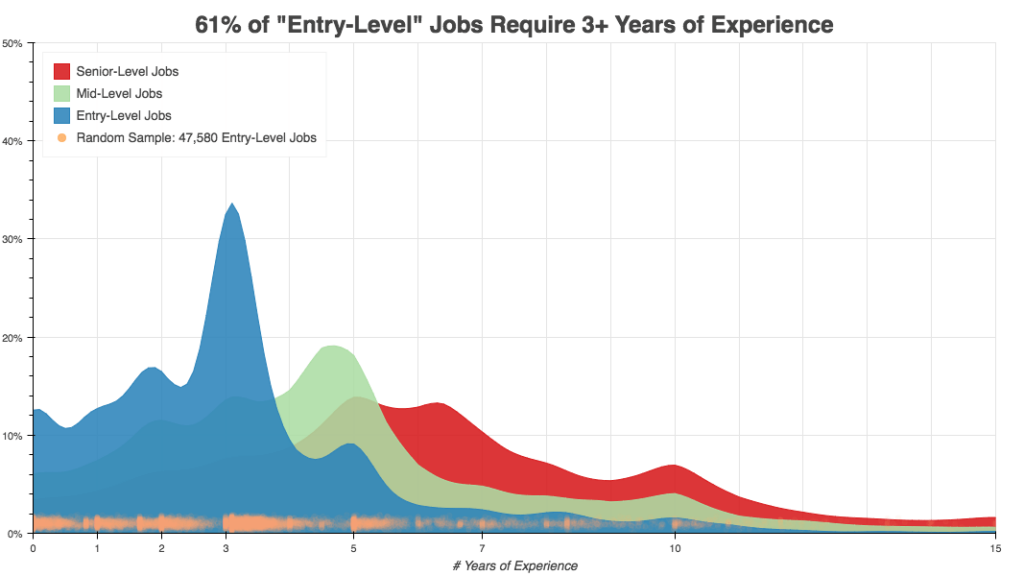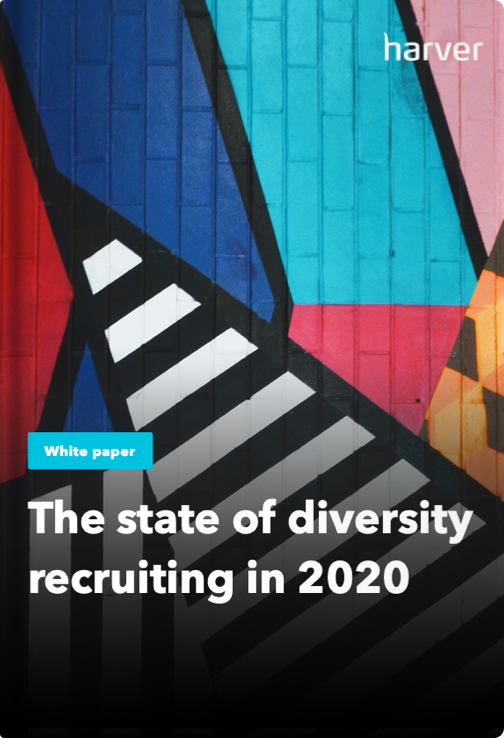Today’s job market is tight. In some professions, the number of open positions actually exceeds the number of people available. One would expect that in this scenario, it wouldn’t be very difficult for companies to find entry-level employees or for fresh college graduates to find jobs; however, that’s not always the case.
Did you know that despite the number of open positions, it takes 7.4 months on average for a new college graduate to find a job? Why exactly is that? Even though 80 percent of employers said they planned to hire college graduates in 2018—up from just 58 percent a decade ago—many new grads are still having a really hard time finding a job after finishing school.
Let’s take a look at the challenges in hiring college graduates, along with a few of the key ways you can tackle them at your organization.
Contents
- Challenges in hiring college graduates
- Ways you can tackle challenges in hiring college graduates
- Rethink your hiring requirements
- Develop a multi-faceted sourcing strategy
- Build a diverse talent pool
- Get the selection process right
- Be smart with timing of your hiring efforts
- Dedicate time and resources to training
- Present a clear company mission
- Offer a flexible environment
- Build out your employer brand
- A closing thought
Like what you see?
Don’t miss out. Subscribe to our quarterly digest to get the latest TA and TM resources delivered right to your inbox.
Challenges in hiring college graduates
Of course, every company has a unique set of hiring challenges when it comes to hiring college graduates. That said, there are some common challenges employers face. We’ll share a few.
Mismatched graduates
These days, it seems there’s an inherent mismatch between what graduates and employers are looking for. While employers are looking for skills and experience, graduates have different priorities. For example, organizational fit, culture, flexibility, and training opportunities are all important to candidates fresh out of college.

70%
of fresh graduates believe that companies are reluctant to hire them because they may lack the necessary hands-on experience.
Source: Entrepreneur.com
Believing that the companies won’t hire them because of the lack of on-the-job skills might discourage the fresh graduates from applying.
Limited sourcing strategy
Some companies struggle with hiring college graduates because they have a limited sourcing strategy—meaning they’re always hiring from the same schools and posting on the same job boards. This hurts diversity within the company and can cause hiring biases.
Some of the common hiring biases include affinity bias, which occurs when we have a natural affinity toward a candidate, and halo bias, or when a recruiter chooses to focus solely on one positive trait while neglecting other important details about the candidate.
Lack of commitment
Other employers find hiring college graduates challenging because they expect them to be fully-fledged professionals instead of being dedicated enough to training and developing them into ones. This lack of commitment is unappealing to today’s graduates, who place significant value on opportunities for learning and development.
Competing for talent
Another big challenge employers face is competing for talent in a candidate-driven market. With low unemployment rates and more open jobs than there are candidates, companies are tasked with finding new ways to attract top talent and beat out competitors. This means employer branding is more important than ever before, as organizations look for creative ways to appeal to college graduates.
Ways you can tackle challenges in hiring college graduates
With the right approach, you can tackle these challenges and be on top of your game when it comes to hiring college graduates. Below are some of our favorite (and efficient) ways to tackle college graduate hiring challenges.
1. Rethink your hiring requirements
Nearly every college graduate knows it all too well: you find an amazing “entry level” job that seems to be exactly what you’re looking for, only to find that it requires several years of experience or a highly advanced skillset. To ease the college graduate hiring process, consider rethinking your experience and skills requirements. What are the absolute musts when it comes to the necessary experience and skills?
Instead of focusing on hands-on experience that is directly relevant, you should aim to focus on transferable skills and look at what candidates did in school beside studying. Internships, part-time jobs, extracurricular activities, and volunteering are all excellent examples of what you can look at to determine whether or not a candidate is a good fit for your organization.

A TalentWorks research showed that 61% of “entry-level” jobs require 3 and more years of experience. That doesn’t sound like advertising those fresh graduate roles right, does it?
By rethinking the job requirements, you will be able to attract more high-potential talent.
2. Develop a multi-faceted sourcing strategy
One of the top challenges companies face when hiring college graduates is sourcing—especially when you’re only hiring from one school. Part of finding the right talent is knowing where to look for it. Instead of honing in on one school in particular, target different universities with relevant programs. College graduates don’t always look for jobs at the places where you advertise them, so targeting multiple schools will increase your likelihood of finding top talent.
However, recruiting college students doesn’t end with job fairs and on-campus recruitment. That’s why it’s important that you do your research about where you can best reach them. For example, certain job boards might be more effective for hiring graduates than others. To determine which are most successful, you should track different recruitment channels to optimize efficiency and costs related to hiring.
3. Build a diverse talent pool
Today, diversity and inclusion in the workplace are more important than ever before. That’s why another way to tackle hiring challenges is to offer training programs and mentoring to current students. In doing so, you can attract a diverse future talent pool and build out your employer brand at the same time.
In this type of program, you should find different ways to engage students and keep them interested in your business. For example, you can offer them relevant content to keep their attention and increase the likelihood of bringing them on full-time after graduation.

74%
of recruiters consider achieving diversity targets as a top challenge in graduate recruitment.
Source: HighFliers.co.uk, The Knowledge Academy
Diversity in the workplace remains a big topic in recruitment in 2019, including in hiring college graduates. Investing in building a diverse talent pool will have a long-term positive effect on your recruitment efforts.
The state of diversity recruiting in 2020
4. Get the selection process right
Using objective assessments in your selection process will help you find the right talent for your organization. These will not only uncover the characteristics of your applicants but also increase diversity of your talent pool.
Don’t forget about the right interview questions. When interviewing the candidates, focus on why they’ve chosen the field they’re in, what they expect from their future workplace, and what their ambitions are, rather than on their skills and experience. This will help you find a candidate who’s a good organizational fit—not just one who fits a list of specific qualifications.
5. Be smart with timing of your hiring efforts
When hiring college graduates, it’s important to time your recruiting efforts right. One of the first things you should do is have a look at whether your hiring calendar corresponds with the academic calendar, as this will impact the availability of new graduate talent. For example, more graduates-to-be will be looking for a job when the end of the academic year is near.
You should also start early with your hiring efforts, as it can take time to find the right fit. Take a proactive approach to help guarantee you’ll find the talent you need, by the time you need it. By taking your time to find and recruit the right candidates, you’re much more likely to end up with new talent that’s a good match for your business.
Did you know that for its International Graduate Program starting in September, the global brewing company Heineken starts the hiring process in November previous year? If you start your graduate hiring too late, you risk losing the best candidates to the competitors who have started their recruitment earlier.
6. Dedicate time and resources to training
Today’s college graduates deeply value opportunities to grow and learn with their employers. That’s why one of your biggest areas of focus should be dedicating time and resources to training your entry-level employees. This will show the college grads you hire that you’re committed to developing your talent and interested in their future.
While they might not have all the necessary knowledge yet, you can teach them that—and also build on their leadership skills in the process. As they learn new skills and gain experience, you can also make it a point to promote from within. This will also help will your hiring efforts, as new grads are attracted to companies that offer opportunities for advancement.
Start the employee development at your company with nurturing a learning-first company culture, approach the needs of your employees individually and define career paths.

92%
of employees consider having access to professional development important or very important.
Source: BetterBuys
Professional development opportunities are of utmost importance when it comes to making career choices. Not only for graduates, but for other employees too.
7. Present a clear company mission
Millennial and Gen Z employees are looking for mission-driven employers that align with their own core values. That’s why it’s a good idea to be clear about what your company stands for and how the mission and values project into daily functioning.
Not only do the younger generations want to know your company’s mission, but also how they can help bring it to life. Employees—especially today’s college graduates—want to know how what they’re doing is contributing to the greater goal of the organization. In other words, they want to do meaningful work that helps move the company mission forward.
8. Offer a flexible environment
One of the best ways you can tackle the challenges of hiring college graduates is to offer a flexible work environment. Unlike some of the other generations in the workplace, Millennial and Gen Z employees place significant value in flexible options.
For example, opportunities to work remotely and flexible scheduling are very appealing to new college grads looking for work. You might also want to consider other flexible options, such as unlimited vacation time or part-time work.
9. Build out your employer brand
Today’s entry-level employees expect more from their employers than just a salary and a desk; they’re looking for companies they’ll be proud to be part of. That’s why it’s so important to focus on building out your employer brand.
By focusing on employer branding, or building a brand that’s seen as an “employer of choice” by new college graduates, companies can beat out competitors and attract top talent. This also helps decrease turnover and improve job satisfaction among your current team members. (After all, who doesn’t want to work for the coolest employer around?)
Check out how these 8 retail companies did it and get some inspiration!

75%
of candidates inspect your employer brand before even applying for a job.
Source: Linkedin
Don’t underestimate the power of the employer brand. It might make a difference in whether or not a candidate even applies to your company.
A closing thought
Despite the possible lack of skills and experience, new college graduates can be a valuable addition to your workforce. They can offer a fresh perspective and share innovative ideas that will help propel your organization forward. Furthermore, they can help close the skills gap appearing after Baby Boomers and Generation X retire.
With recent graduates, you have a unique opportunity to develop managers of the future. Don’t make the mistake of wasting that opportunity by looking for solely looking for skills you can teach and experience they can gain at your organization!
The state of diversity recruiting in 2020



